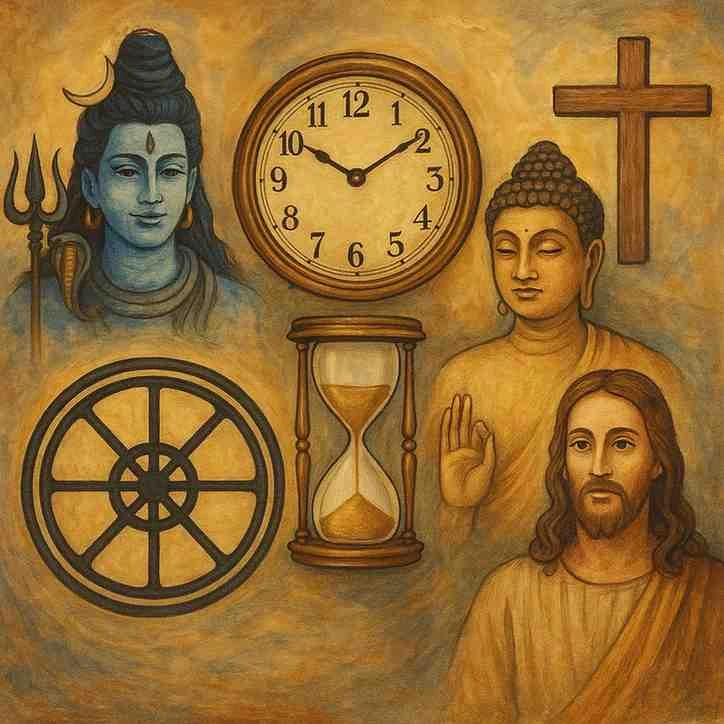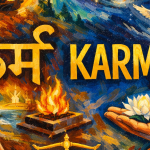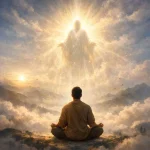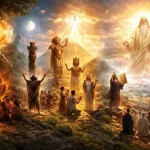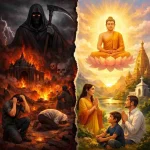The Concept of Time in Hinduism, Buddhism, and Christianity
The understanding of time has shaped how religions view the universe, life, and human purpose. Hinduism, Buddhism, and Christianity—three of the world’s most influential faith traditions—offer deep yet distinct interpretations of time. Their perspectives influence spiritual practice, moral responsibility, and the believer’s view of creation and destiny. While Hinduism and Buddhism often see time as cyclical, Christianity generally perceives time as linear, moving from creation toward a divinely guided conclusion. Each tradition brings a rich heritage of scriptures, philosophies, and theological insights that help explain humanity’s place in the vast movement of time.
Hinduism: A Cyclical and Infinite Understanding of Time
Hinduism presents one of the world’s oldest and most expansive interpretations of time. Rooted in scriptures such as the Vedas, Upanishads, and Puranas, time (Kala) is considered both eternal and rhythmic. Hindu cosmology describes time as moving in vast cycles that repeat endlessly, emphasizing the universe’s continual creation, preservation, and dissolution.
Time is cyclical, expressed through the four Yugas (Satya, Treta, Dvapara, Kali) forming one Mahayuga.
Creation and destruction occur repeatedly, guided by Brahma, Vishnu, and Shiva.
Kala (Time) is a divine force, sometimes personified and seen as beyond human control.
In Hindu thought, one cycle of creation lasts billions of years, reflecting the enormity of cosmic time. Brahma’s lifespan—described in Puranic literature—is said to extend over trillions of human years. Human life, by contrast, is brief, yet meaningful because each action influences karma and future rebirths within these vast cycles.
Time is not merely a measure of hours and years; it is the framework within which the soul journeys through many lifetimes. The cyclical nature of time teaches detachment, patience, and the understanding that all worldly conditions are temporary. At the same time, it highlights the eternal nature of the Atman (soul), which exists beyond time and seeks ultimate liberation (moksha).
Buddhism: Time as Impermanence and Continuous Becoming
Buddhism shares several ideas with Hinduism, especially the cyclical notion of rebirth, but its view of time emphasizes impermanence (anicca) and the constant unfolding of the present moment. Time is not seen as an absolute entity; rather, it is understood through experience and change. Buddhist teachings from the Tipitaka highlight that all conditioned things arise and dissolve moment by moment.
Time is defined by impermanence, not by a beginning or end.
The cycle of rebirth (samsara) continues until one attains Nirvana.
Focus on the present moment, as the past and future are mental constructs.
While Buddhism acknowledges vast cycles of existence, including cosmic expansion and contraction mentioned in some Mahayana texts, the emphasis is always on the present moment. The Buddha taught that liberation comes through awareness of impermanence and the cessation of desire, rather than through speculating about the universe’s beginning or end.
In Buddhist philosophy, time is more psychological than physical. Because the self (anatta) has no permanent essence, time becomes a stream of ever-changing moments. Recognizing this truth leads to wisdom and reduces attachment. Meditation practices such as mindfulness (sati) train followers to live fully in the now, where transformation truly occurs.
Christianity: A Linear Movement of Time Toward Divine Fulfillment
Christianity offers a fundamentally different view of time compared with Hinduism and Buddhism. Time is understood as linear, created by God with a definite beginning and destined to reach a meaningful conclusion. The Bible begins with the words “In the beginning, God created the heavens and the earth” (Genesis 1:1) and ends with the Book of Revelation, which describes the fulfillment of God’s plan.
Time has a clear beginning, rooted in God’s act of creation.
History moves toward a divine purpose, culminating in the Second Coming and eternal life.
Human life is unique, with one earthly lifespan followed by judgment and resurrection.
In Christian theology, human beings are placed within a purposeful timeline. Events such as the birth of Christ, the Crucifixion, and the Resurrection are central moments that shape the direction of history. Time is meaningful because it reflects God’s unfolding plan for salvation.
Unlike the cycles found in Eastern traditions, Christianity teaches that history is not repetitive but progressive. Each moment is an opportunity to align with God’s will. The hope of eternal life beyond time gives believers a sense of direction, moral responsibility, and spiritual confidence.
The concept of time in Hinduism, Buddhism, and Christianity reveals deep differences yet a shared sense of spiritual purpose. Hinduism views time as a vast, recurring cycle shaping countless lifetimes. Buddhism sees time through the lens of impermanence and the transformative power of the present moment. Christianity presents time as a purposeful journey from creation toward eternal fulfillment. These perspectives help millions understand their place in the universe, guiding how they live, act, and seek spiritual meaning.
~Religion World Bureau

